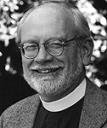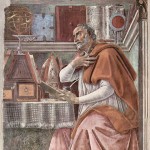William Countryman – Homosexuality and the Bible
Scripture scholar William Countryman is part of a movement that threatens to split the Anglican Communion. Throughout its history, Christianity has held that homosexuality is an immoral act. Over the last 20 years, Papal pronouncements have referred to the sexuality of gays and lesbians as “disordered” and the act itself as “intrinsically” evil, while at the same time deploring acts of malice and violence toward homosexuals. The movement to give homosexuals full standing in the Episcopal Church has reached the point of severe strain with the confirmation of the election of the first openly gay bishop, the Rev. Gene Robinson, as Bishop of New Hampshire in August 2003.
I had always wondered how Gay Liberation in Christianity was going to deal with St. Paul’s condemnation of it in his letter to the Romans, Chapter 1. (Jesus makes no reference to homosexuality in the Gospels.) When I came across Countryman’s Dirt, Greed, and Sex. I thought that it was probably the most provocative titled book by a scripture scholar that I had ever seen.
Countryman’s thesis is simple. Romans has been misread. According to Countryman, Paul was addressing a church (congregation) which he had not visited. The group in Rome was having what today we call a cross cultural conflict. Jewish Christians objected to unclean items and practices that were part of the culture of Gentile Christians. In the first part of Romans, Countryman says that Paul was playing up to the Jewish Christians and their moral sense of superiority in order to reprimand them later. The upshot is that the Jewish Christians are not supposed to require the same observance of ritual purity by the Gentile Christians.
However, Gentile Christians are to avoid certain acts such as meat sacrificed to idols in order not to trip up (scandalize) others in their faith. In fact, Paul doesn’t see division because of the Jewish ritual purity code as the big problem. The bigger divisive issue is greed.
Countryman’s book is a very carefully crafted and detailed piece of scholarship. My description of it in the previous paragraph is a great oversimplification. The key point though, is that is possible to see the scriptural basis against homosexuality in both the Old and New Testaments in a different light based on a careful study of the language and culture of the time.
This approach is giving many Christians more than heartburn. Anglicans in Africa whose culture opposes homosexuality make up a great part of the opposition. Interestingly, polygamy is socially acceptable among many African Christians. If one can take such a linguistic and cultural approach to scripture and even tradition, should the Episcopal Church accept polygamy?
The question was part of a April 24, 2005 podcast interview with Countryman at Grace Cathedral in San Francisco. As a Roman Catholic, I have to confess some culture shock. The openness and frankness of the discussion, while refreshing, is very different from an environment in which the boundaries of belief and practice are more strictly defined. Even in everyday matters, Catholics – of a certain age – recall parents or teachers indicating that there was to be no more discussion when they heard in Latin or English “Roma locuta, causa finita.” “Rome has spoken, the matter is closed.”
This came up in the podcast regarding Anglican rejection of both Rome’s direct control of discussion by bishops and theologians and Geneva’s (read Calvin’s) objection to inquiry. “Rome cannot err. Geneva will not err.” Although dialog and collegiality among bishops may be a significant part of the culture of the Episcopal Church, what do you do when the other side doesn’t want to talk?
On the other hand what do you do when your personal experience tells you that there are good people out there who are involved – even in love with – a person of the same sex?
Stay tuned.
Read More










